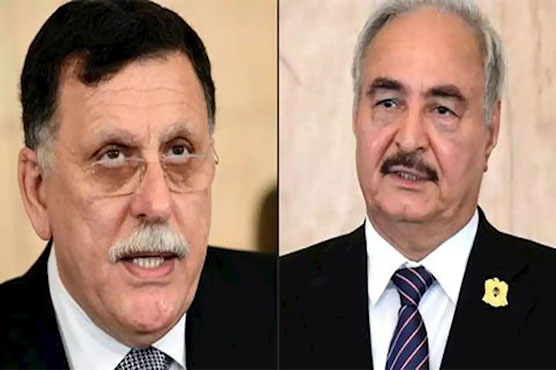Libyan rivals to sign ceasefire deal in Moscow Monday: official

The signing of the agreement will pave the way for the revival of the political process in Libya.
TRIPOLI (AFP) - The head of Libya s UN-recognised Government of National Accord (GNA) Fayez al-Sarraj and his rival, strongman Khalifa Haftar, are expected to sign a ceasefire agreement in Moscow on Monday, a senior Libyan official said.
The oil-rich North African country has been wracked by bloody turmoil since a 2011 NATO-backed uprising killed long-time dictator Moamer Kadhafi, with multiple foreign powers now involved.
The signing of the agreement will pave the way for the revival of the political process, said Libya s head of High Council of State Khaled al-Mechri on the country s al-Ahrar TV channel.
Mechri said he would accompany Sarraj to Moscow, while parliament speaker Aguila Salah will travel with Haftar.
Sarraj on Monday called on Libyans to "turn the page on the past", as he prepared to sign the agreement.
"I call on all Libyans to turn the page on the past, reject discord and to close ranks to move towards stability and peace," he said in a short televised speech.
Both sides in Libya s conflict had already agreed to a ceasefire from Sunday to end nine months of fighting, following weeks of international diplomacy and calls for a truce by power-brokers Russia and Turkey.
The GNA in Tripoli had been under attack since last April from forces loyal to Haftar, which on January 6 captured the strategic coastal city of Sirte.
Late on Saturday, Haftar s forces announced a ceasefire starting at midnight (Sunday 0000 local time, Saturday 2200 GMT) in line with a joint call by Turkish President Recep Tayyip Erdogan and his Russian counterpart Vladimir Putin.
Sarraj, who met Erdogan in Istanbul on Sunday, confirmed the ceasefire had taken effect.
Europe and North Africa have also launched a diplomatic offensive to try to prevent Libya, with the increased involvement of international players in its conflict, from turning into a "second Syria".
European governments, including former colonial power Italy, fear that Islamist militants and migrant smugglers, already highly active in Libya, will take further advantage of the chaos.
The US embassy in Libya, in a statement Saturday, voiced its "serious concern about toxic foreign interference in the conflict".
It said "Russian mercenaries" had backed Haftar s Libyan Arab Armed Forces, while "Turkish-supported Syrian fighters" had backed the GNA.
"All responsible Libyan parties should end this dangerous escalation and reject the destructive involvement by foreign forces," the embassy said.
On Saturday, Putin and German Chancellor Angela Merkel at talks in Moscow threw their weight behind the Berlin conference being organised by UN special envoy Ghassan Salame that could be held in the coming weeks.
Putin on Saturday again denied Russia had deployed mercenaries to Libya.

